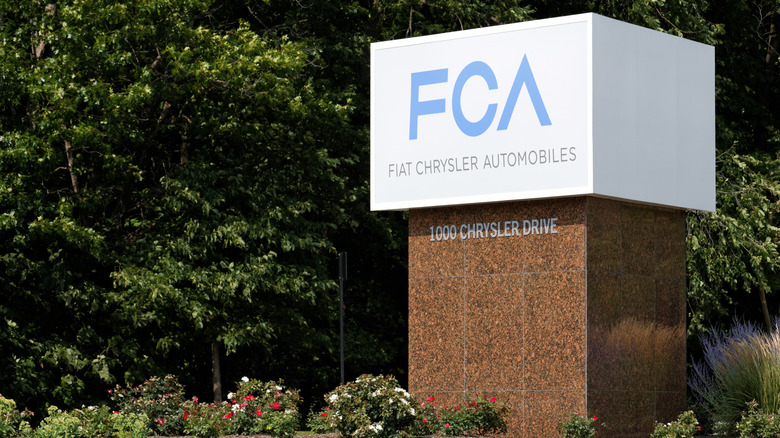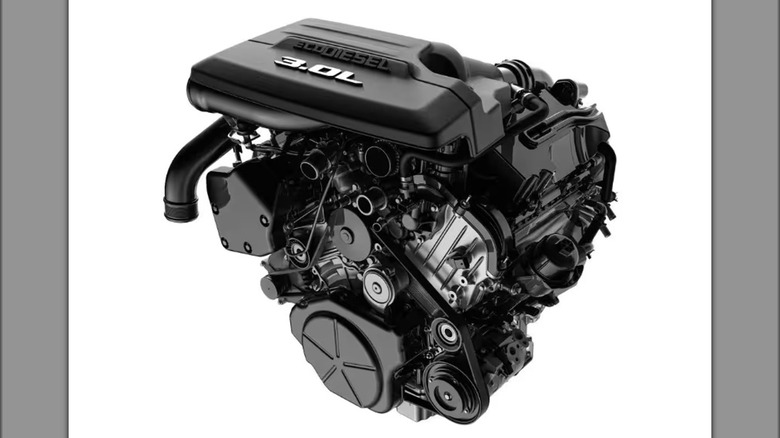Everything You Need To Know About Fiat Diesel Engines
In the latter half of the 19th century, inventors experimented with various methods to power automobiles, including steam. But, along came a German man, Rudolf Diesel, who wanted a better way to transform heat into energy. The first Diesel engine surfaced in the 1890s but didn't initially perform as expected. It wasn't until almost 1900, and several modifications, that the diesel engine became an attractive alternative to steam.
Over the decades, many changes to the diesel engine have made it almost unrecognizable from its original 19th-century prototype. Fiat Chrysler Automobiles is ranked seventh in the world for vehicle manufacturing and encompasses several brands, such as Alfa Romeo, Dodge, Jeep, Ram, Chrysler, and Fiat. VM Motori, an Italian diesel engine maker, is owned by Fiat and responsible for iterations like the EcoDiesel (which is one of the top ten most reliable diesel engines ever built) and Duramax. But there's a reason why these diesel engines special and why are they becoming rarer among the latest models.
The JTD Unijet Turbo, Duramax, and EcoDiesel
Once Fiat purchased Alfa Romeo from the Italian government in the mid-80s, they started making the JTD common rail direct injection system or UniJet Turbo Diesel (JTD) engines. The JTD was more efficient than previous efforts, utilized more of the available fuel for energy, and featured a quiet and smooth operation.
Another engine crafted from Fiat owned VM Motori is the 2.8L Duramax turbo diesel inline 4-cylinder found on Chevy Colorado models from 2016 through 2022 in the U.S. With 181 horsepower, 369-pound feet of torque and 7,700 pounds of pulling capacity, this small diesel engine packed a punch. It was also able to achieve an estimated 30 mpg on the highway, which offered drivers both efficiency and performance.
One of the most notable diesel engine designs from Fiat Chrysler Automobiles was the 3.0L EcoDiesel V-6, which was featured in vehicles like the Jeep Grand Cherokee and Ram trucks. At 3.0L, this engine produces 240 horsepower, 420 pound-feet of torque, and an estimated 28 mpg on the highway.
Diesel engines get a black eye: Volkswagen shenanigans and Fiat recalls
The outlook for diesel engines was promising, with enhanced efficiency and lower cost. According to Statista, diesel fuel consumption has remained relatively constant between 2,500 and 3,000 barrels per day since 2000. But then, a Volkswagen scandal put a wet blanket on the popularity these VM Motori-made engines were enjoying. Essentially, many U.S. diesel engine Volkswagens came equipped with technology to identify an emissions test and altered the engine settings to pass. Once revealed, the EPA took Volkswagen to court for violations, and there was a massive recall. It wasn't just Volkswagen, though; FCA faced huge fines over Jeep and Dodge emissions cheating, specifically with the 3.0L diesel engine models.
As if cheating emissions standards wasn't enough bad press for diesel engines, Fiat Chrysler had another situation with a massive recall of 133,000 diesel vehicles from across the world. From 2014 through 2019 various models were affected such as the Jeep Grand Cherokee, Ram 1500, and Chrysler 300. A magnetic sensor could fall off the crankshaft severing the connection with the engine system causing a shutdown. Since reliability is considered one of the diesel engine's strongest benefits, failing emissions and stalling problems pushed their popularity downward.


